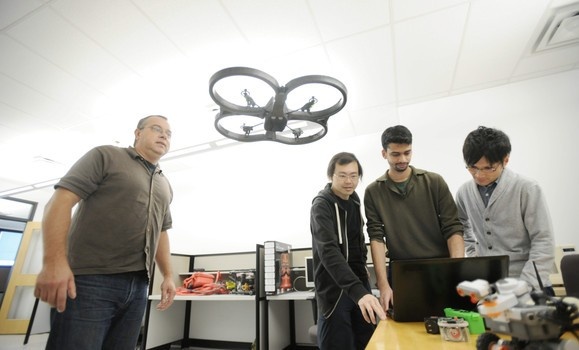
High-flying adventures in the lab of CS faculty member Thomas Trappenberg. (Danny Abriel photo)
Computer Science lets developers and researchers alike create solutions that address not only everyday problems, but also the problems of the future. It’s a constantly evolving field that requires all involved to keep apace of new developments and to be ready to boldly face what’s what yet to come.
That’s the mission of Dalhousie’s Faculty of Computer Science — a mission that’s been reinforced with the recent renewal of its Bachelor of Computer Science (BCS) programs’ accreditation by the Canadian Information Processing Society (CIPS) Computer Science Accreditation Council. The Faculty received full accreditation for 2014-2020 for each BCS program, including those with co-operative education and honours options.
Why accreditation matters
When a program within a university is accredited, it receives a national — and, in cases like this, international — recognition for its quality.
There must be a common approach to education and curricula to achieve a standard level of professional knowledge among all IT professionals. The CIPS review process ensures all graduating students of a program have a defined set of attributes necessary for a professional career in that field.
Accreditation provides employers the assurance of quality graduates who meet industry expectations for professionalism and sector-relevant expertise.
“At Dalhousie we take accreditation of our professional programs seriously,“ says Carolyn Watters, provost and vice-president academic. “Accreditation is important not only to ensure the high national quality of programs like Computer Science for employers but as a measure for students themselves — as a point of pride of the high standards of their program and of their own achievement”
It’s also a sign of international quality.
“Our accreditation is not only recognized in Canada, but also internationally by signatories of the Seoul Accord,” says Mike Shepherd, dean of the Faculty of Computer Science.
Established in 2008, the Seoul Accord is an international accreditation agreement for professional computing and IT academic degrees between current signatory bodies: Australia, Canada, Chinese Taipei, Hong Kong, China, Japan, Korea, the United Kingdom and the United States.
“Graduates of accredited programs in any of these countries are recognized by each of the other countries as having met all academic requirements as an IT professional,” says Dr. Shepherd. “This significantly expands a student’s career options at an international level.”
How the BCS program succeeds
CIPS has established a rigorous accreditation process to evaluate educational programs and their level of performance, integrity and quality to inform and protect the public. It involves a visit by an on-site team, which evaluates the Faculty based on: (1) the university environment; (2) faculty; (3) students; (4) curriculum; and (5) facilities and resources.
The evaluation identified 27 strengths of Dal’s BCS program with a few in particular singled out for praise, most notably enrolment growth: total enrolment in the BCS programs has doubled since 2009.
Also highlighted was the Faculty’s active Industry Advisory Board, which ensures strong ties are kept and nurtured within the ICT industry and that the program adapts to and meets current trends and needs. Strong ties with local, national and international IT professionals provide new funding, resources and research projects — something undergraduate students benefit from as they work directly with profs and grad students on innovative research. The review also noted the program’s options in Alumni Mentorship and Co-operative Education that offer students further opportunities to enhance their education.
Computer Science is also home for the newly formed ICT Sandbox (in partnership with SMU, NSCAD, NSCC and Volta). The Sandbox supports students who wish to learn more about entrepreneurship through validation of their own technology-related business ideas. The evaluating team highlighted the sandbox as “an impressive idea that should be further developed.” This, along with the university-wide policy on intellectual property and its ownership residing with the inventor, “strongly encourages invention…a powerful incentive for student creativity.”
Recent News
- Ridwan Oladipupo's Articipay
- Calling all gamers: develop your own video game at Global Game Jam 2025
- Computer Science student’s startup promises to make driving safer
- Future alumni: Seif Elbayomi
- Computer Science alum says mentorship is a powerful tool
- Protecting our health, oceans, and future: Dal innovators celebrated at 22nd annual Discovery Awards
- Dal researcher is making smart home devices safer
- Tech triumph: Dalhousie wins big at 2024 Digital Nova Scotia awards
